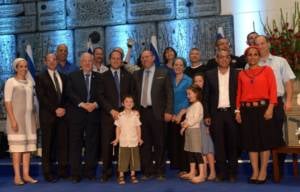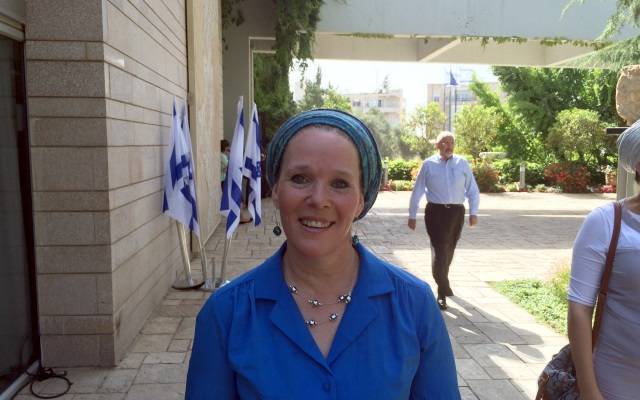
President Reuven Rivlin, Mayor Nir Barkat and the families of the three murdered teens. (Haim Zach/GPO)
Rachel Fraenkel, the bereaved mother of teenager Naftali, who was murdered by Arab terrorists in 2014, has joined together with the families of two other boys who were killed together with her son to unite the people of Israel through the Jerusalem Unity Prize event.
The Jerusalem Unity Prize, established after the kidnapping and murder of three Israeli teens – Eyal Yifrach, Gilad Shar and Naftali Frankel – by Hamas terrorists two years ago, was awarded on Wednesday at the President’s Residence as part of Jerusalem Unity Day. The prize honored organizations that made significant contributions towards unity in Israel and in the Jewish world at large.
“The Jerusalem Unity Prize and Jerusalem Unity Day, which we mark today, is a day which asks of us to preserve that ‘togetherness’, this time out of choice,” President Reuven Rivlin said in his address.
“Jerusalem Mayor Nir Barkat approached us during the shiva [mourning period] and suggested that we participate in something like this,” Rachel Fraenkel, bereaved mother of murdered teenager Naftali Fraenkel, said.
“It developed into the Jerusalem Unity Prize and then into Jerusalem Unity Day with the help of the organization Gesher so people are doing special unity activities today,” she continued.
Barkat had approached the families of the teens during the period of mourning after witnessing the very prevalent sense of unity in Israeli society after the teens’ abduction.
“During those difficult days of uncertainty about the fate of the three boys, we saw all the people of Israel—secular, ultra-Orthodox, young, old, on the right, and on the left—praying together, shoulder to shoulder, in an extraordinary display of the strength of Israel’s unity,” related Barkat at the awards ceremony.
“Days later, during the week of shiva for the boys, I felt that the bridges that the families had built between the different sectors of Israeli society, especially at the most difficult of times, must be preserved and that we must build other such bridges,” added Barkat.
The Need to Act
Fraenkel already felt the need to act by the time Barkat had approached her with the idea for a Jerusalem Unity Prize.
“We became very aware of the special spirit that evolved over that summer and we personally felt a responsibility both to give back and to try to preserve that spirit,” Fraenkel noted .
In addition to the awards ceremony, the special spirit noted by Fraenkel is preserved on Jerusalem Unity Day through a plethora of events and activities promoting the concept of unity throughout Israel and the Jewish world.
“Jewish communities are doing things to bring different types of Jews together both in the State of Israel throughout the education system, the army, youth movements, and in adult education as well as in 25 other countries around the world,” Fraenkel explained.
“In Israel, this also includes other populations such as the Druze, Arabs, and people that are marginalized for other reasons like special needs and we hope that out of the bitter comes forth sweetness.”
Fraenkel says that when people in Israel look back to that bitter time, they always recall that sweet sense of unity that existed throughout the country and that it serves as a motivating factor for any future challenges.
“When people recall that period, I see that they remember the tragedy and sometimes have tears in their eyes, but they also feel good about who we were as individuals, as a people, and about our ability to connect with and really care about and open up to other kinds of people,” Fraenkel said. “That’s something that we like remembering in order to be able to reach that point again in the future.”
Fraenkel hopes not only for internal Jewish unity, but for unity with Israel’s Arab neighbors as well.
“When I speak to my children who lost their beloved brother to a group of 30 Palestinian terrorists who organized the attack, I tell them that I don’t want them to be raised on hatred,” Fraenkel contended. “I make sure that they know the difference between Hamas and our Arab neighbors.”
“It sounds cliche,” Fraenkel noted. “But it’s simply about the ability to open up and feel close to others despite the differences and to find common ground.”
By: Jonathan Benedek/TPS
